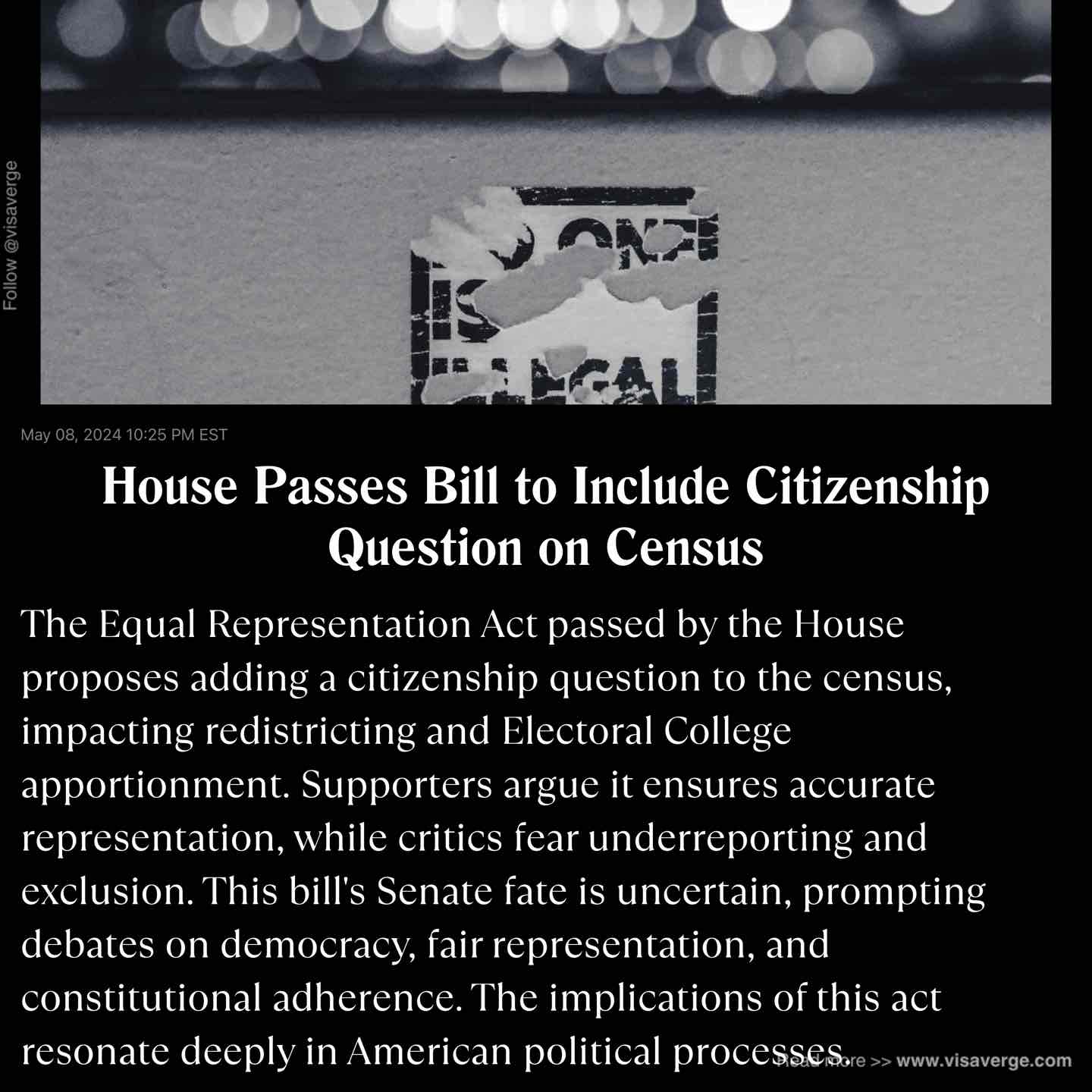What Is the Equal Representation Act?
The House of Representatives recently passed a controversial bill known as the Equal Representation Act, which has sparked debate across political lines. With a close vote count of 206 to 202, the major change proposed by this act is the inclusion of a citizenship question in the upcoming census, a move that aims to fundamentally alter who is counted for the purposes of Congressional redistricting and Electoral College apportionment. Introduced by Rep. Chuck Edwards (R-Ill.), the bill garnered the support of over 100 co-sponsors.

How might adding a citizenship question impact census redistricting?
The primary rationale behind this legislative move is to ensure that only American citizens influence the political landscape of the country, according to proponents of the bill. “Including the count of non-US citizens in determining how many congressional seats and electoral votes each state has is skewing the representation of Americans in their federal government,” mentioned Rep. Edwards in a statement. This perspective holds that the presence of non-citizens, specifically illegal immigrants, could distort electoral outcomes, potentially undermining the democratic process.
However, the introduction of a citizenship question to the census risks alienating non-citizen residents and could result in underreporting. There’s a fear that it would dissuade honest participation, thus hampering the accuracy of the census. Critics, including Rep. Jamie Raskin (D-Md.), argue that such a measure contradicts the intentions set forth in the Constitution, which mandates the counting of “persons” rather than “citizens” for redistricting purposes.
Will the Equal Representation Act affect Electoral College Apportionment?
Yes, by potentially excluding millions from being counted in the census, the Electoral College apportionment could see significant shifts. Historically, areas with large immigrant populations could lose representation if non-citizens are not included in these counts. This would alter the political map significantly, often favoring less diverse, more homogeneously citizen-populated states.
What does the Constitution say about this issue?
The 14th Amendment of the Constitution clearly states that representatives should be apportioned among the states “according to their respective numbers, counting the whole number of persons in each State”. This has been interpreted to mean everyone residing in the states, irrespective of their citizenship status. Therefore, to change who is counted in the census could potentially require a constitutional amendment, a point highlighted by Rep. Raskin when he critiqued the bill: “We’re simply trying to follow what the Constitution says, which I know is kind of a radical proposition around here these days.”
Historical attempts to change census questionnaires
Notably, this is not the first attempt to modify the census to include a citizenship question. Former President Donald Trump also pushed for such a change during his administration, which was ultimately blocked by the Supreme Court in 2019. The court’s decision highlighted concerns about the rationale behind the question, leading to legal roadblocks that prevented its inclusion.
What’s next for the Equal Representation Act?
While the House has passed the Equal Representation Act, it is anticipated to face significant challenges in the Senate. This political standoff reflects wider debates about immigration, representation, and fairness in electoral processes. It underscores deep divisions on how the foundational democratic processes of the country should operate and who should have a voice in shaping them.
For those interested in the intricate details of how census data impacts legislative and electoral processes, the United States Census Bureau offers comprehensive resources and official documents that provide further insights.
Conclusion
The debate around the Equal Representation Act brings to the fore fundamental questions about democracy, representation, and the interpretation of the Constitution. As the United States continues to grapple with these challenging issues, the outcome of this legislative effort will have long-lasting implications on the fabric of American political life and its democratic institutions. With the next decennial census set for 2030, the resolution of these debates will crucially shape the future political landscape of the nation.
Learn Today:
Glossary
- Equal Representation Act: A legislative bill proposed to include a citizenship question in the census for the purposes of Congressional redistricting and Electoral College apportionment. The bill aims to alter who is counted in the population data, potentially impacting political representation in the United States.
-
Citizenship Question: A query proposed to be added to the census questionnaire to ascertain the citizenship status of individuals residing in the country. Including this question can affect how population data is used for electoral processes and may influence representation in government.
-
Non-Citizens: Individuals residing in a country who are not citizens by legal status. In the context of immigration and the census, the count of non-citizens can impact how resources are allocated, representation in government, and the overall demographic landscape.
-
14th Amendment: An amendment to the United States Constitution that mandates apportionment of representatives based on the total number of persons in each state, regardless of citizenship status. This legal provision plays a crucial role in determining how population data is used for political representation.
-
Electoral College Apportionment: The process of distributing electoral votes among states based on their population data. Changes in who is counted in the census, such as excluding non-citizens, can lead to shifts in Electoral College apportionment, influencing the outcome of presidential elections.
This Article In A Nutshell:
The Equal Representation Act, a contentious bill recently passed by the House of Representatives, proposes adding a citizenship question in the census for redistricting and Electoral College decisions. Advocates argue it ensures only citizens impact politics, but critics fear it may deter accurate reporting and contravene constitutional principles, sparking intense debate.
— By VisaVerge.com
Read More:
- USCIS Policy Shift: Prioritizing Employment for Inadmissible Migrants
Read the full article - Proposed Bill Alert: Impact of New Immigrant Gun Law on Firearm Purchase Notifications
Read the full article -
2024 Federal Budget: How It Affects Canadian Immigrants
Read the full article -
Exploring America’s Most Immigrant-Friendly Cities
Read the full article -
Unlocking Citizenship: The Route to Naturalization for 14,000 Delaware Immigrants
Read the full article









